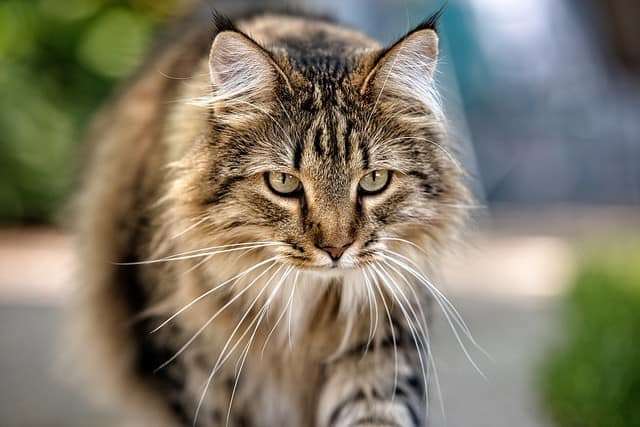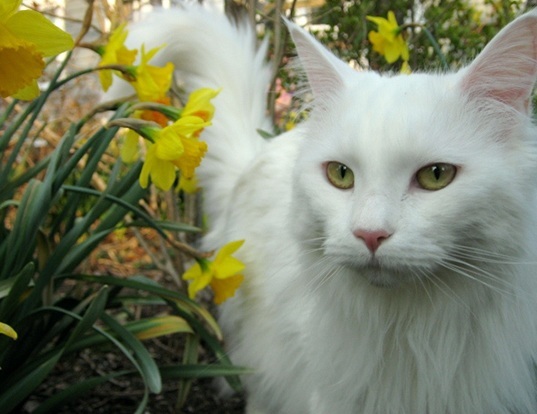You’ve returned home, ecstatic with your purchase of a cute Maine Coon cat. This slight fluff immediately wins your heart and becomes an indispensable family member.
Unfortunately, the sad reality is that our pets don’t often live as long as we do, so you’re probably wondering how long Maine Coon cats can live. A Maine Coon cat’s typical lifespan is about 12.5 years, while some have been known to live up to 15 years. Their lifetime is determined by their lifestyle, general health, genetics, food, and physical activity.
Given their muscular bodies, Maine Coons are thought to be a challenging and sturdy breed. They had to be strong and uncompromising because they came from brutal weather and the sea. However, it may come as a surprise that a Maine coon cat’s average lifespan is only 10 to 15 years. That isn’t to say it isn’t short; it is, but it isn’t as short as one might assume.
Maine Coons are in the middle of the pack. The life expectancy of most cat breeds is comparable or falls within this range. There are a few outliers that differ by a hair’s breadth.
Keeping your cat healthy and learning about the variables contributing to a long life can help your cat live a much longer life. In this post, we’ll discuss the life of a Maine Coon cat, as well as what to expect at different stages of their development.
What Is The Average Life Span Of A Maine Coon?
Maine Coons cats are a healthy breed in general. It is not difficult to care for a coon, and no extra attention is necessary compared to other cats. While Maine Coon cats can grow to be rather large and require more food than a smaller cat, no additional actions or routines are required to keep a Maine Coon cat in excellent condition. Maine Coon cats are thought to live for 12 to 15 years on average. However, according to statistics from a study, a significant number of people live to be at least 16.5 years old.
What Affects A Maine Coon’s Life Expectancy?

Given their size, Maine Coon cats have an unusually long life expectancy. You should be aware of the following elements that influence your life expectancy.
Diet
If you want your Maine Coon cat to live longer, make sure they are fed a healthy, well-balanced diet. This should preferably be fat-free, high-quality, and high-protein and nutrient content. In addition, high-quality dry food diets are better for the Maine Coon breed since they help prevent tartar formation on the teeth.
- Overfeeding: Overfeeding your Maine Coon, on the other hand, is one of the most significant health dangers for your cat since it commonly leads to obesity and may shorten your Coon’s lifespan. If your Maine Coon isn’t getting enough activity and looks to be gaining weight, consult a veterinarian to see if they need to be put on a low-calorie diet plan.
Exercise
Maine Coons require regular exercise to keep their bodies fit and healthy and to extend their lives. Owners should play with their Coons daily to increase cerebral stimulation while also raising the cat’s activity level. This playtime has the extra benefit of strengthening the attachment between the owner and the cat.
The Maine Coon kitten is noted for being highly playful; however, the adult Coon, exceptionally if maintained as an indoor cat, may require more encouragement to exercise.
Health Problems
Maine Coons, like any purebred cats, have genetic health issues that influence their quality of life. There are three major health issues that Maine Coons might inherit.
l Hypertrophic Cardiomyopathy (HCM) is an acronym for hypertrophic cardiomyopathy. HCM is a condition in which the heart’s walls are too thick to contract adequately. The gene that causes this will be passed down to one in every three Maine Coon cats. This is usually detectable early in life. Check with your veterinarian to see whether an ultrasound is possible.
l Hip Dysplasia is a condition that affects the hip joint’s formation. This ailment affects 23% of Maine Coons, and it can develop into hip arthritis. Hip dysplasia is associated with stiffness and limping. According to one study, males have a slightly higher risk of hip dysplasia than girls. It also affects older cats more than younger cats.
l SMA (Spinal Muscular Atrophy) is a condition that appears early in the life of a kitten. This is a hereditary condition that causes the spinal cord to develop abnormally. As a result, the kitten will struggle to walk and lose muscular mass in its back legs.
Environment
This is a rather broad category that goes through the differences in longevity between indoor and outdoor cats. Aside from that, there could be other cats that aren’t so kind, continual stressors, or hazardous chemicals in the environment. Some of these factors, such as genetics and breed, are predisposed. But, on the other hand, you have control over some things.
Because they are in a safe setting, indoor cats live longer. However, outdoor cats have a lot on their minds. Because of the dangers of automobiles, dogs, other cats, and numerous poisons, outdoor cats have a shorter lifespan. Car exhaust and fertilizer, for example, can make an outside cat sick.
Genetics
Genetic illnesses, more than anything else, decrease the life expectancy of a Maine Coon. Unfortunately, the Maine Coon is prone to Hip Dysplasia as a result of its enormous size. It’s a genetic condition that affects vast breeds of dogs and cats, such as the Maine Coon. This type of sickness causes arthritis in cats, but it is not life-threatening in most cases. However, if left unchecked, it can result in paralysis.
Hypertrophic Cardiomyopathy is a severe illness that affects a few Maine Coons. It is something that can be found in the genes of this enormous breed. Although Maine Coons are affected, it is a rare occurrence. Maine Coon kittens are also susceptible to a hereditary illness that can cut their lifespan in half. Spinal muscular atrophy (SMA) is a disorder that causes muscle weakness, with symptoms appearing as early as three months.
Also Read: Maine Coon Size
How To Help Your Maine Coon Cats Live Longer?

Feeding your Maine Coon good food, being conscious of their weight and environment, having them exercise, avoiding exposing them to stresses, and taking your cat to the vet regularly can all help your cat live a longer and happier life.
-
Allow Them To Play And Exercise As Much As They Want
Maine Coon cats are large, fluffy energy balls. They are naturally curious and enjoy “hunting” games. It would be fantastic to provide them with various toys and quality time with their owners to encourage them to play and exercise. Exercise not only keeps their bodies healthy, but it also makes them happy.
-
A Lot Of Affection
Cats are independent creatures, but loving owners make them happier for more extended periods. Giving Maine Coon cat’s attention and affection will go a long way toward ensuring that they have a good quality of life. Having a cat is a great responsibility, but these adoring felines never fail to return the love. Maine Coon cats are highly devoted to their humans. All of your love and compassion for them will undoubtedly be handsomely rewarded.
Final Words
No one can adequately forecast the exact age that your beloved Maine Coon pet will reach, so bear in mind that the quality of care that your Maine Coon cat receives over their lifetime will have a significant impact on their lifespan. Therefore, owners should pay close attention to their Maine Coons’ health and well-being throughout their cat’s life to guarantee that their pedigree cat has the best possible quality of life. Additionally, it is critical that owners only feed their giant cats a high-quality dry food diet with high protein content.







